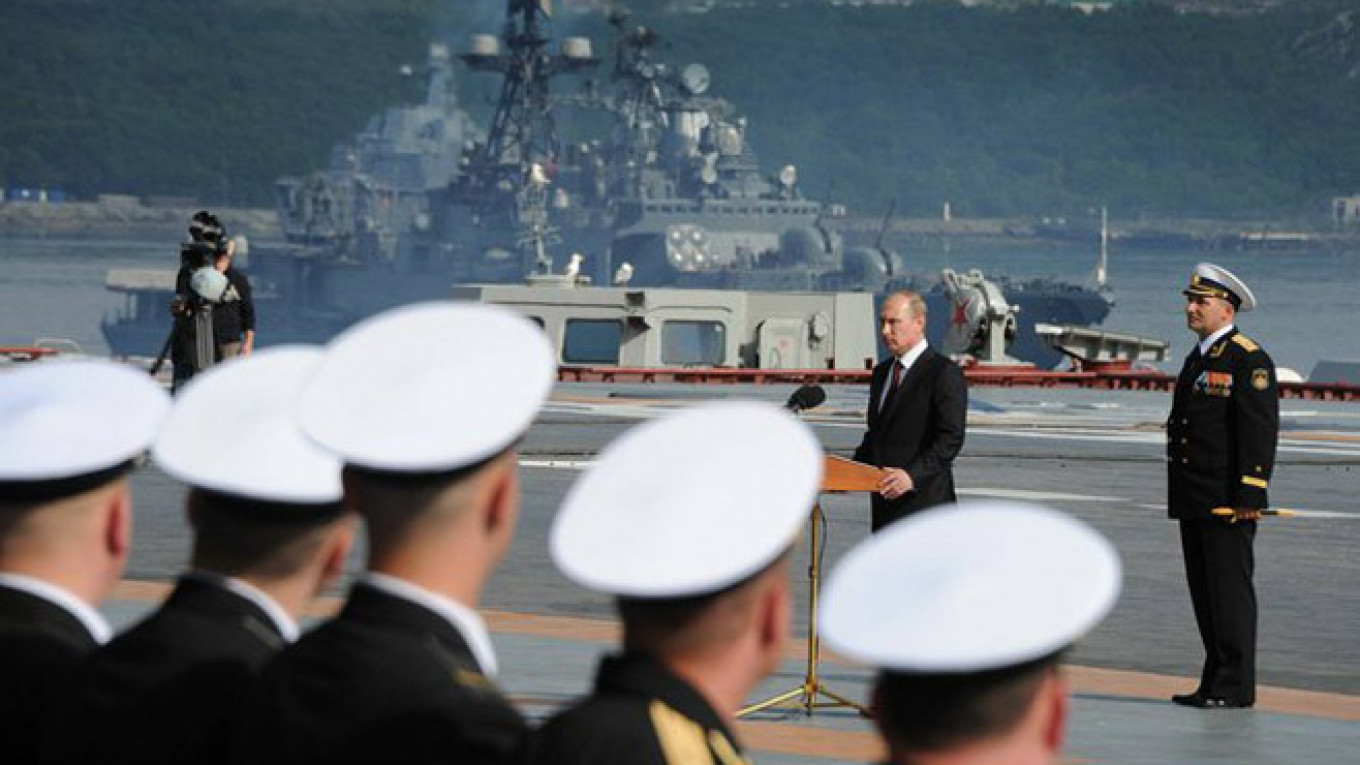Russia started building its three newest submarines on Sunday in the White Sea port of Severodvinsk, marking the halfway point in the country’s drive to re-establish its place as a modern naval power.
Speaking aboard the Admiral Kuznetsov aircraft carrier during Russia’s Navy Day celebrations in Severomorsk near Murmask, President Vladimir Putin stressed the importance of the navy to Russia’s security and identity.
“The navy, for our country, is her pride, strength and dignity,” Putin said, RIA Novosti reported. Putin also pledged that “the power and strength of the Russian navy will only grow.”
The building of the submarines — the Borei-class Knyaz Oleg, the Yasen-class Krasnoyarsk and the Khabarovsk, which appears to be an updated Yasen — is part of a naval modernization program initiated by Putin.
Overall, Russia is engaged in a $700 billion military rearmament program through 2020.
Also in Severodvinsk, Deputy Prime Minister Dmitry Rogozin, who oversees Russia’s defense industry, said the vessels were important tools in the struggle against NATO encroachment on Russian sovereignty.
“Today, when the U.S. and NATO countries are trying to impose their political agenda, when they are trying to push other countries to their knees … the factors of power become crucial,” Rogozin was quoted as saying by Interfax.
“At this moment, Russia is a nation that represents the axis of good, but good can only be defended by force,” he added.
The two submarine classes differ in terms of their capabilities. Borei-class nuclear missile submarines are designed to strike cities, while the Yasen submarines are suited to hunting other submarines and surface vessels.
Russia has already deployed two Borei submarines, the Yury Dolgoruky and the Alexander Nevsky. The third Borei, the Vladimir Monomakh, finished its sea trials on Sunday and is awaiting its official commission into the Russian navy, while the Knyaz Vladimir, the fourth vessel, is still under construction.
Eight of the Borei-class submarines will join the fleet by 2020, replacing the aging Typhoon-class submarines and the Delta-III and Delta-IV submarines, which had been the mainstay of Soviet sea-based nuclear deterrence since the 1970s.
The Boreis are five meters shorter than the 175-meter Typhoons — the largest submarines ever constructed — and will carry intercontinental ballistic missiles.
As for the Yasen-class submarines, the lead boat — called the Severodvinsk — joined the Russian navy in June. The next two Yasen-class vessels, the Kazan and the Novorossiisk, are being built.
Russian authorities hope that the two new submarines will revive the Russian navy as a player on the high seas, after it lost much of its naval might to neglect and decay during the turbulent 1990s.
There are currently 60 submarines serving in the Russian navy, RIA Novosti reported. Ten of them are strategic nuclear missile submarines, while the rest are nuclear-powered attack submarines and diesel-electric submarines, such as the Kilo.
See also:
2nd Mistral Warship Set For Mediterranean Role
Contact the author at m.bodner@imedia.com
A Message from The Moscow Times:
Dear readers,
We are facing unprecedented challenges. Russia's Prosecutor General's Office has designated The Moscow Times as an "undesirable" organization, criminalizing our work and putting our staff at risk of prosecution. This follows our earlier unjust labeling as a "foreign agent."
These actions are direct attempts to silence independent journalism in Russia. The authorities claim our work "discredits the decisions of the Russian leadership." We see things differently: we strive to provide accurate, unbiased reporting on Russia.
We, the journalists of The Moscow Times, refuse to be silenced. But to continue our work, we need your help.
Your support, no matter how small, makes a world of difference. If you can, please support us monthly starting from just $2. It's quick to set up, and every contribution makes a significant impact.
By supporting The Moscow Times, you're defending open, independent journalism in the face of repression. Thank you for standing with us.
Remind me later.






